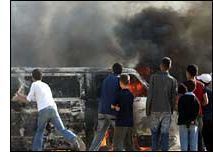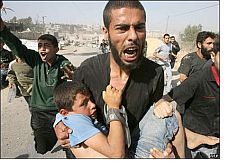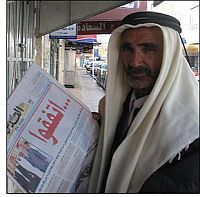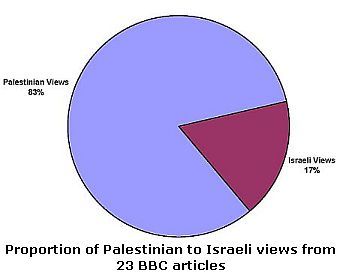EXCLUSIVE – SIX MONTH ANALYSIS – BBC: THE SUBTLE BIAS
![]()
CLICK HERE TO PRINT OR SAVE THIS REPORT IN WORD FORMAT
The BBC is an organization under pressure. Over the past few weeks, the international broadcasting giant has seen its reputation reach its lowest ebb as a result of:
- Allowing an openly anti-Semitic posting to remain on a messageboard, which falsely claimed that Jewish Talmudic law allows Jews to lie to non-Jews and that Zionism is a racist ideology. Only after pressure from UK Jewish organizations did the BBC eventually remove the offensive posting.
- Faking phone-in competition winners on a popular children’s TV show and a major charity fundraising event (more examples of faked phone-ins are also coming to light).
- Editing a documentary trailer that falsely made the Queen look like she had stormed out of a photo shoot.
No other international media outlet elicits as many complaints of bias from our readers as the BBC. If the organization is capable of showing such little respect for the British monarch and the British public (which pays a compulsory license fee for the privilege of funding the BBC), is it any surprise that it consistently treats Israel with utter disdain?
HonestReporting took a snapshot of BBC reporting of the Arab-Israeli conflict over the first six months of 2007.
BBC Reporting During the First Six Months of 2007 – Summary of Findings:
- Headline selection for stories in relation to violent incidents is inconsistent. 15% of stories about Palestinian violence named the aggressors while 60% of articles about Israeli operations accused Israel directly.
-
Greater attention is paid to Palestinian voices and opinions than Israeli ones. 19 out of 23 articles and picture series capturing the “man on the street” perspective were from the Palestinian viewpoint.
This is the first in a new HonestReporting series that will analyze whether specific media outlets demonstrate a discernible bias over the long term. Bias in the mainstream media can sometimes be patently clear – deliberately manipulated or staged photographs, articles comparing Israel to apartheid South Africa, or sympathetic descriptions of terrorists, to name but a few. We try to respond to all of these cases, encouraging you, our readers, to contact the media directly and ask why the facts are not being reported accurately.
However, bias is often more subtle. There is nothing inherently suspect about a picture of a Palestinian civilian or a human interest story detailing the life of a Palestinian child. An account of a Palestinian shopkeeper’s life can be useful in shedding light on how the conflict affects ordinary people. Articles and photographs can be 100% accurate and, taken at face value, are completely within the realms of professional journalism.
Yet, a closer examination of specific media outlets over a longer period of time can reveal troubling patterns which indicate a more subtle and potentially more harmful bias. When pictures and accounts detailing only one side of a conflict are given prominence on an almost daily basis, it is a classic example of a bias so deep that it colors a media organization’s entire reporting.
 HonestReporting’s researchers recently completed a six month study of articles appearing on the BBC News website. We monitored 286 articles and pictures appearing on the BBC News website from January 2007 until June 2007. What we saw was a clear pattern of showcasing the Palestinian perspective, at the expense of Israeli voices.
HonestReporting’s researchers recently completed a six month study of articles appearing on the BBC News website. We monitored 286 articles and pictures appearing on the BBC News website from January 2007 until June 2007. What we saw was a clear pattern of showcasing the Palestinian perspective, at the expense of Israeli voices.
Headlines and Grammatical Style in “Hard News” Articles
Finding: BBC headlines and text tend to use a style that describes Palestinian violence ambiguously (only naming the aggressor 15% of the time) while being much more direct in cases where the Israeli military is involved (Israel is mentioned in 60% of these cases.)
Editors often create extremely succinct headlines to refer to complicated stories. The headline can take a variety of styles. An “attack” can name the attacker, the victim, or both. The headline can utilize a strong, active verb such as “attacks”, “kills”, “shoots”, etc. Or it can be more subtle i.e.: “man dies after attack.” But is there consistency? The results of our study are revealing in that they show that there is a different style that is used depending on the subject of the headline.
For example, On May 7, 2007, the BBC covered Palestinians firing Qassam rockets into the Israeli town of Sderot. In response, the Israeli Air Force struck a car carrying two men on their way to launch more Qassams. The BBC article carried a strong, active headline: “Israel air strike hits north Gaza“. It was only in the fourth paragraph that the Qassam attack that precipitated the air strike was mentioned.
 In isolation, the use of the active tense does not indicate any sort of bias. However, compare the above headline with a story from May 15, 2007 describing a Hamas attack which left eight Palestinians dead. Rather than a headline similar to the one from May 7, the BBC employed a softer approach with “Eight killed in ‘ambush by Hamas’“. The second paragraph details how “16 people have died (emphasis added) in Gaza since Sunday.”
In isolation, the use of the active tense does not indicate any sort of bias. However, compare the above headline with a story from May 15, 2007 describing a Hamas attack which left eight Palestinians dead. Rather than a headline similar to the one from May 7, the BBC employed a softer approach with “Eight killed in ‘ambush by Hamas’“. The second paragraph details how “16 people have died (emphasis added) in Gaza since Sunday.”
Other headlines that describe Palestinian-initiated violence were either written without naming the aggressor at all, or written in the passive tense: “Gaza unrest gains own momentum“ (May 16), “Gaza erupts in renewed violence“ (May 17), “Threatened at a Gaza roadblock“ (May 18), and “Fresh violence hits Gaza Strip“ (May 19). In many cases, passive language described the event in the opening paragraph (“At least 20 people have been killed“). The two reported cases (in May, 2007) of Palestinian attacks against Israelis featured similar headlines: “Israeli dies in Gaza rocket raid“ (May 21), “Casualties in Jerusalem shooting“ (May 26). Technically, these articles are not incorrect. If an Israeli died after a rocket attack, it is not wrong to use a headline such as the one above.
 However, in the vast majority of articles reporting on Israeli actions, the headlines were more direct: “Israel launches raids into Gaza” (May 17), “Fresh Israeli air strike on Gaza” (May 19), “Israel backs tougher Gaza action” (May 20), “Israel hits Hamas politician home” (May 21), “Israel strikes at Hamas in Gaza” (May 23), “Israel renews strikes across Gaza” (May 26), and “Israeli raids follow PM’s warning” (May 28). While all these headlines appeared during the month of May (a month in which there was a great deal of reporting on violent attacks), the pattern is consistent.
However, in the vast majority of articles reporting on Israeli actions, the headlines were more direct: “Israel launches raids into Gaza” (May 17), “Fresh Israeli air strike on Gaza” (May 19), “Israel backs tougher Gaza action” (May 20), “Israel hits Hamas politician home” (May 21), “Israel strikes at Hamas in Gaza” (May 23), “Israel renews strikes across Gaza” (May 26), and “Israeli raids follow PM’s warning” (May 28). While all these headlines appeared during the month of May (a month in which there was a great deal of reporting on violent attacks), the pattern is consistent.
In fact, during the first six months of 2007, out of 26 articles reporting on violent attacks perpetuated by Palestinian groups (on either Palestinians or Israelis), the group responsible for the violence was mentioned in only 15% of the cases. By contrast, in 38 articles where an operation was carried out by Israel, Israel was directly named in 60% of the headlines.
Selection of Perspectives in “Soft” News
Finding: The BBC consistently highlights Palestinian perspectives at the expense of Israeli voices. In twenty-three articles containing pictures and interviews of random subject, nineteen were of Palestinians.
 Another form of subtle, long term bias can be detected in “human interest” stories. For statistical consistency, we discarded all articles written in response to a specific news event. We also did not include articles that solely featured the viewpoint of a government official, either Israeli or Palestinian. Instead, we examined those focused on the Palestinian or Israeli “man on the street”. For example, a January 19 article (“Frustration over Ramallah violence“) gives the perspective of three Palestinians. Another January article (“Voices: Palestinian faction violence“) gives four Palestinian perspectives. In February, “Gaza viewpoint” interviews a Palestinian mother who describes the violence in Gaza. While she does not mention Israel in the short piece, it is linked to her blog, in which she makes clear her opinion that even the fighting between rival Palestinian groups is Israel’s fault.
Another form of subtle, long term bias can be detected in “human interest” stories. For statistical consistency, we discarded all articles written in response to a specific news event. We also did not include articles that solely featured the viewpoint of a government official, either Israeli or Palestinian. Instead, we examined those focused on the Palestinian or Israeli “man on the street”. For example, a January 19 article (“Frustration over Ramallah violence“) gives the perspective of three Palestinians. Another January article (“Voices: Palestinian faction violence“) gives four Palestinian perspectives. In February, “Gaza viewpoint” interviews a Palestinian mother who describes the violence in Gaza. While she does not mention Israel in the short piece, it is linked to her blog, in which she makes clear her opinion that even the fighting between rival Palestinian groups is Israel’s fault.

During this same time period, there are interviews with Israelis, but these are centered around issues not directly concerned with conflict (such as internal Israeli political events). In fact, the perspective of Palestinians was highlighted with far greater frequency than Israelis. Over the six month period, there were ample opportunities where a “Voices” piece could have focused on Israeli families living under constant rocket attack in Sderot, for example.
Conclusions
-
While the BBC does not overtly distort facts in its Middle East coverage, a number of subtle biases combine to create a false impression of the Israel-Palestinian conflict. As a result, the British public and the BBC’s many international viewers are poorly equipped to assess the situation accurately.
-
By presenting coverage that builds empathy for the Palestinians at the expense of Israelis, the BBC is manipulating public opinion rather than promoting open debate – the foundation of democratic action.
-
Readers should insist on coverage that allows all relevant voices equal time and space to present their views. Only then is the public good truly being served.
-
Contact the BBC and demand more balanced coverage in its reporting of the Middle East.
We plan to continue publishing long term analyses of specific media to determine whether reporting is fair and consistent. If you are interested in sponsoring one of these reports, please click here.

